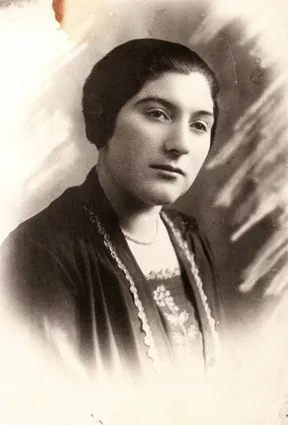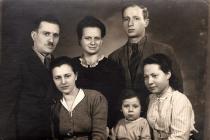This is a picture of my eldest sister Golda.
When I was born there were already 5 children at home before me. The eldest, Golda, was 18. They were thinking, about her, to get her married, but they were having trouble. She worked, she was a very resolute, bright girl. But what? She didn't mix with company. And because she didn't mix with company, she didn't have any friends. My second sister, Rajzla, who was about 3 years younger than her [b. 1903], went to the organization [Bund] and she had friends. And then there was the first son, who was called Ksil, born in 1905. So he was 13 when I was born and he went to cheder like all the other boys. Then there was Menasze, born in 1908, and in 1912 a third daughter was born, Ryfka, who was 6 years older than me, but she went to Polish elementary school. That was the first one who went to school.
All 3 sisters got married before the war and I remember the weddings. They were religious. What is the wedding? They take the future husband and with the future wife they are stood under a canopy and the rabbi says some prayer. They get a glass and take care that it's a fine one, and at a certain moment the man breaks the glass to recall the destruction of Jerusalem. They all had it.
I sometimes used to go to my sister Golda in Czerniakow, that was a very long way. I used to walk an hour and a half. My parents, you see they couldn't use transport on Saturdays, they used to go 2 and a half hours on foot to go and see their first grandson there. Golda's husband was called Froim Sziber. He was a cobbler, totally illiterate. When I used to go by tram I would take books and in the evenings I'd read to them. Sometimes he'd still be sitting and working and I would read him books. It was kind of moving that he got so much joy from those books, that he liked it so much. And my sister too. They liked each other so much. They lived in their shop, so they made a piece of canvas to divide the first room where he worked off from where she had her workshop, there she made all sorts of knits [e.g. gymnastics suits, swimsuits, ballet wear]. When I was working in Warsaw I would buy goods for her and he came and took it and she always made some design. Swimsuits that didn't sell, I took them, went to the wholesale and sold them. When I went to them, I slept on the other side from them, but it was the same room.
When she had to go to the hospital [to have her babies], I went to their house every evening to take her. I took her in a taxi that went via Zelazna Street, and crossed over the tracks and bounced, and she screamed: 'Oy, oy!' Well then it [the birth] went fast after that. When she had twins, at the hospital in Czyste they told me: 'It's a girl, but call back in 20 minutes. I called back in 20 minutes: 'There's another girl.' I had to go and register.
During the war Golda was in the Warsaw ghetto with my parents and her children. Her husband was killed by a bomb. She and her children were taken to Treblinka.


















